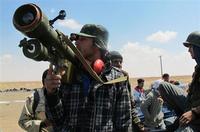-
Iran to send a first contingent of 4,000 Iranian Revolutionary Guards to Syria

In preparation for the attack by Assad forces on rebel-held Aleppo, Iran announced it is sending a first contingent of 4,000 Iranian Revolutionary Guards to Syria to help the Syrian military. Iran’s goal is to help Assad capture Aleppo, and inflict a decisive defeat on the rebels, before U.S., and European, military aid begin to make a difference on the battlefield. Iran has also announced that it and Hezbollah are planning to open up a new “Syrian” front on the Golan Heights against Israel, and the presence of 4,000 Revolutionary Guards in Syria will allow Iran to do so. The United States responded by saying that 3,000 U.S. troops, a detachment of F-16s fighter jets, and batteries of Patriot missiles will remain in Jordan after the joint U.S.-Jordan military exercise they are currently participating in is over.
-
-
Improving close air support for faster, more precise airstrikes
Air-ground fire coordination — also known as Close Air Support or CAS — is a dangerous and difficult business. While its tools have become more sophisticated, CAS has not fundamentally changed since the First World War. Now, Persistent Close Air Support (PCAS) program aims to improve air-to-ground fire coordination, but could revolutionize military technology development and deployment as well.
-
-
Webcast of Forensic Handwriting Analysis Conference available online
On 4-5 June 2013 NIST and partnering organizations hosted the Measurement Science and Standards in Forensic Handwriting Analysis Conference. In case you missed this event or would like to view/listen again to the presentations, the archived video of the Webcast is now available online.
-
-
U.S. confirms: Assad used chemical weapons against Syrian rebels, civilians (updated)

The Obama administration has informed Congress a few minutes ago that the U.S. intelligence community has determined that the Assad regime has used chemical weapons on several occasions against both rebel forces and Syrian civilians. The U.S. intelligence community says these attacks, each using small quantities of sarin gas, have killed about 150 Syrians. The president’s deputy national security adviser, Ben Rhodes, told reporters that the president had decided to provide “direct military support” to the opposition. Rhodes said the U.S. military assistance to the rebels would be different in “both scope and scale” from what had been authorized before, which included non-lethal equipment such as night-vision goggles and body armor.
-
-
Detecting explosives, not toothpaste
Researchers want airports, border checkpoints, and others to detect homemade explosives made with hydrogen peroxide without nabbing people whose toothpaste happens to contain peroxide. This is part of the challenge faced in developing a portable sensor to detect a common homemade explosive called a FOx (fuel/oxidizer) mixture, made by mixing hydrogen peroxide with fuels.
-
-
Justice Department endorses NYPD’s stop-and-frisk

The Justice Department (DOJ) has entered the debate on the New York Police Department’s stop-and-frisk policy, telling a federal judge that DOJ endorses the program as long as there is independent oversight to monitor changes in the policy if civil rights violations occur.
-
-
U.S. confirms: Assad used chemical weapons against Syrian rebels, civilians
The Obama administration has informed Congress a few minutes ago that the U.S. intelligence community has determined that the Assad regime has used chemical weapons on several occasions against both rebel forces and Syrian civilians. The U.S. intelligence community says these attacks, each using small quantities of sarin gas, have killed about 150 Syrians.
-
-
NSA director: surveillance programs prevented “dozens” of terror attacks
Gen. Keith Alexander, the director of the National Security Agency (NSA) and commander of the U.S. Cyber Command, told lawmakers yesterday (Wednesday) that the NSA’s electronic surveillance programs have been indispensable in thwarting “dozens” of terrorist attacks on targets in the United States and abroad. He told the senators that securing a “cyber arena” could be done without infringing upon the privacy rights of Americans. “We do not see a tradeoff between security and liberty,” Alexander said, later adding, “We are trying to protect Americans.”
-
-
Al Qaeda-affiliated militants training in using shoulder-fired anti-aircraft missile

A Xerox copy of a 26-page manual with instructions on how to use man-portable air-defense systems, or MANPADS – also called SA-7 — was found in a building in Timbuktu in North Mali which was used by Al Qaeda in the Islamic Maghreb operatives during the 8-month control – April 2012 to February 2013 — of the area by Islamist militants. The Libyan military under Col. Qaddafi had about 15,000 SA-7s, but after the Qaddafi regime fell in November 2011, NATO forces and Libyan militias loyal to the government gained possession of only 5,000 of them. The rest have disappeared into the arsenals of different militias, and have probably found their way to different terrorist organizations in North Africa and the Middle East.
-
-
ACLU files lawsuit challenging NSA's phone surveillance
In the wake of the past week’s revelations about the NSA’s surveillance of phone calls, the yesterday American Civil Liberties Union (ACLU) filed a lawsuit charging that the program violates Americans’ constitutional rights of free speech, association, and privacy.
-
-
Responding to public health emergencies

Over the past decade, community engagement has become a central tenet of U.S. federal approach to public health emergency preparedness. Little is known, however, about how the vision of a ready, aware, and involved populace has translated into local practice.
-
-
Making jet fuel from switchgrass

The Energy Department’s National Renewable Energy Laboratory (NREL) is partnering with Cobalt Technologies, U.S. Navy, and Show Me Energy Cooperative to demonstrate that jet fuel can be made economically and in large quantities from a renewable biomass feedstock such as switch grass. The project could spur jobs in rural America, lead to less reliance of foreign oil.
-
-
White House to conduct urgent, comprehensive review of U.S. Syria policy
The White House today and tomorrow is conducting an urgent, and comprehensive, review of U.S. Syria policy, with a major policy announcement expected Wednesday or Thursday. The urgency is the result of changes on the battlefield. Bolstered with thousands of Hezbollah fighters, growing financial support from Iran and Iraq, around-the-clock arms shipments from Iran and Syria, and more direct Iranian involvement in overseeing the regime’s military operations, the Assad government has been able to turn the tide of war in its favor. Senior administration officials believe that arming the rebels may no longer be sufficient to reverse the Assad government’s gains unless the United States takes additional, and more direct, steps like carrying out airstrikes against Syrian forces.
-
-
Social media analytics help emergency responders
If you think keeping up with what is happening via Twitter, Facebook, and other social media is like drinking from a fire hose, multiply that by seven billion — and you will have a sense of what researchers who are working on SALSA (SociAL Sensor Analytics) are facing. Efforts of emergency responders and public health advocates could be boosted by SALSA.
-
-
Edward Snowden, an NSA contractor employee, says he is the source of NSA leaks
Edward Snowden, a 29-year-old former technical assistant in the CIA and more recently an employee of the defense contractor Booz Allen Hamilton, has identified himself as the source of the leaks about three massive NSA surveillance schemes. Snowden says the NSA’s surveillance activities are all-consuming; these activities “are intent on making every conversation and every form of behavior in the world known to [the NSA].” He said that once he concluded that the NSA’s surveillance scheme would soon be irrevocable, it was just a matter of time before he chose to act. “What they’re doing” poses “an existential threat to democracy,” he said.
-
More headlines
The long view
How Quickly Could Iran Make Nuclear Weapons Today?
For Iran, two of the three poles in the tent of building nuclear weapons – fissile material and delivery vehicles — are essentially complete. It will take them one week to enrich enough uranium to 90 percent for one bomb (and one month to enrich enough uranium for six bombs). Iran also has a variety of delivery systems, including nuclear-capable missiles: the delivery pole is ready. Weaponization is the pole that needs more work. The accelerated weaponization program can be accomplished in a matter of six months.
Fifty-Five Hours of Risk: The Dangerous Implications of Slow Attack Attribution
Assuming that its foreign adversaries’ recent violent threats are to be taken seriously, and that the likelihood of a direct attack against the United States is, if not on the rise, at least significant enough to warrant serious attention, the United States has an urgent mandate to prepare effective cognitive defenses. Foremost among these is the ability to quickly and accurately attribute attacks to their originators, and to deliver that information to the public through a trustworthy vehicle.
What Can We Learn from the Nation’s Historic Decline in Murders?
The U.S. endured a spike in gun violence during the pandemic, but it’s subsiding in many places. A researcher puts the latest homicide statistics into context — and warns lawmakers not to become complacent.
Is Left-Wing Terrorism Making a Comeback in Germany? Analyzing the “Engel – Guntermann Network”
For Germany, the reemergence of more violence orientated left-wing extremist actors has diversified the threat posed by non-state actors even further. Violent left-wing extremism is also of growing concern across Europe. While left-wing violent extremism does not currently represent as acute a threat as currently manifested by jihadist and right-wing terrorist attacks, the recent concerning trend among German left-wing extremists is toward greater violence and transnationalism.
Saving Seconds, Saving Lives: NIST-Funded Challenge Crowns Winners in 3D Tracking Technology
NIST has awarded $1.9 million to six teams for innovative 3D tracking solutions in the final phase of a competition. The winning designs combine localization and biometric monitoring, using sensors affixed to first responders’ equipment. This competition is part of an $8 million NIST-funded initiative to address first responders’ need for improved tracking in emergency settings where GPS falls short.
For First Responders, Communication with Their Teams is Essential
When a first responder enters a building during an emergency, they count on being able to communicate with their team at all times. Their safety and their ability to carry out the mission relies on knowing they can reach help and support anywhere that they need to go within a structure.
